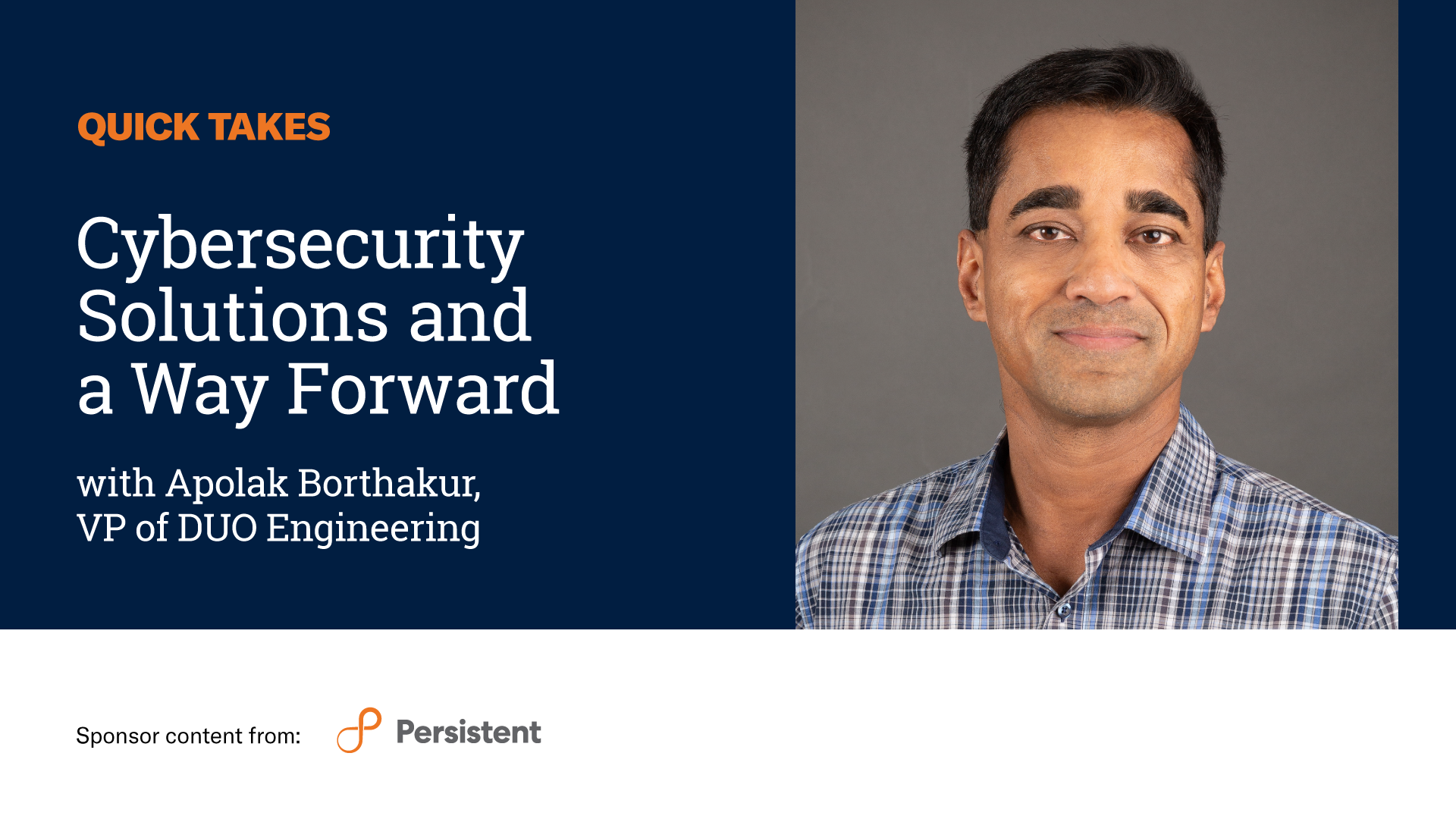Todd Pruzan, HBR: Welcome to the HBR Video Quick Take. I’m Todd Pruzan, Senior Editor for Research and Special Projects at Harvard Business Review.
We’re here with Apolak Borthakur, Vice President of Duo Engineering at Cisco, for his insights on organizations’ challenges in balancing cybersecurity with user experience and where AI fits into that evolution. Apolak, thanks so much for being with us.
Apolak Borthakur, Cisco: Thank you. Great to be here.
Todd Pruzan, HBR: Apolak, what is your experience at Cisco in developing and implementing cybersecurity strategies and solutions?
Apolak Borthakur, Cisco: I lead the Cisco Duo product line at Cisco. Duo is a leading identity security vendor, and we’re very widely deployed. I believe we have over 30 million licensed users, and we process almost 2 billion authentications every month. And as part of the leadership team within Cisco Security, I do participate in planning and strategy. And then I’m super heavily involved in mergers and acquisitions.
Todd Pruzan, HBR: OK, thank you. I appreciate the context. What are the key emerging trends and technologies that you’re seeing in cybersecurity?
Apolak Borthakur, Cisco: I’ll touch on a couple of them, one being the shift from point products to integrated platform solutions. And this makes it a lot easier for customers because then they don’t have to replicate tasks across the different products. And also, with a platform you’re able to see end-to-end correlations. And that is not something you can get if you have individual point products.
Another trend that we’re seeing is the shift to identity becoming the new perimeter for security. And as workloads move to public clouds and SaaS, a lot of the infrastructure that hackers used to leverage now go below the waterline as far as they’re concerned. So they’re doubling down on getting in via identity breaches. And finally, AI and, in particular, Gen AI, still early, but lots of interesting potential.
Todd Pruzan, HBR: OK. So three pretty strong trends you’re seeing. Apolak, how is Cisco balancing the need for strong security with user experience when you’re designing and implementing a security solution?
Apolak Borthakur, Cisco: Well, being a security product, it’s absolutely fundamental that our own product has to be completely secure for us to continue to win the customer’s trust. And then we also need to make sure that we’re enabling customers to accomplish their security efficacy goals.
But more than ever, we’re hearing from customers the need for a simplified user experience, and we’ve taken it very seriously. So, for example, if you look at Duo, we’ve invested very significantly in design. And design is a fundamental part of our development process now.
Also, Duo has the mission to democratize security, to make it affordable and available even for small and medium businesses. And if you look at our business, we have a significant chunk of it coming from our customers that never, ever have to talk to a Cisco Duo employee. And this is only possible because we’ve been passionate about democratizing security and providing customers with a very simplified experience.
Todd Pruzan, HBR: And I’m sure customers can really feel that difference. How is Cisco managing the ever-evolving landscape of digital threats? What are your expectations of service providers, like Persistent Systems, in managing these threats?
Apolak Borthakur, Cisco: Cisco Security has a number of deep capabilities across multiple areas. But the real value that we’re now bringing is that we’re bringing it all together into a single integrated platform so that we can provide customers end-to-end visibility and correlation that nobody else can provide.
And this is super important because if you take any common breach scenario, for example, a phishing attempt, you need solutions across your email, threat detection, endpoint, network identity. And we have them all, and we’ve brought them all together so that you can really get to the results that you need as a customer.
With regards to Persistent, we use them in all aspects of engineering. And that includes development. That includes quality, as well as project management.
Todd Pruzan, HBR: OK, thanks. Apolak, what do you see for the future of applying AI to cybersecurity?
Apolak Borthakur, Cisco: There is a lot of potential in, well, first of all, taking the existing machine learning and analytics that we already use for things like detecting suspicious and abnormal behavior, as well as potential root causes. But, in particular, Gen AI.
Generative AI– that’s an interesting new field. And, as you know, we’ve released Assistants and CoPilots, but we’re just starting to scratch the surface. There is so much more that we could potentially do.
At the very high level, Generative AI allows customers to specify their queries in natural language. And behind the scenes, it can go and collect data from multiple sources, analyze it, and generate a response that makes it easier for the customer to do their job. So lots of interesting potential there.
Todd Pruzan, HBR: That sounds like a lot of potential. Apolak, thank you so much for sharing all of your insights today about the current and the future state of cybersecurity and its ongoing evolution.
Apolak Borthakur, Cisco:Thank you so much for having me.
Todd Pruzan, HBR: We’ve been speaking with Apolak Borthakur, Vice President of Duo Engineering at Cisco about cybersecurity. To learn more, click the link below.
Explore the key findings on Enterprise IT Security at Persistent.com, where customer-focused enterprise IT security solutions are designed to strengthen and transform all aspects of your organizational security infrastructure.
Learn more about Enterprise IT Security with Persistent.

